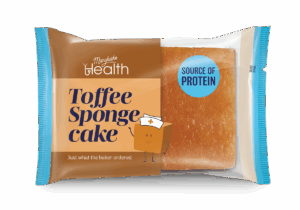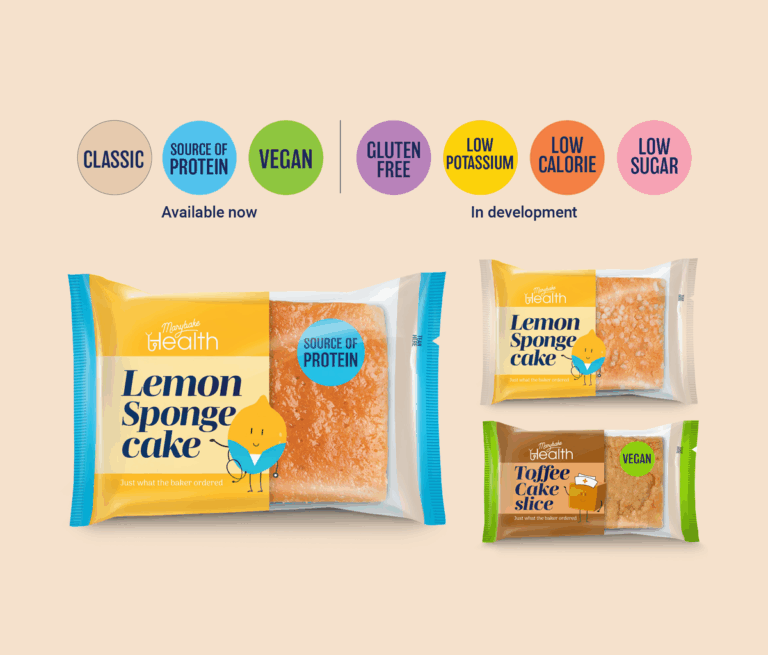Q&A with Noor Al-Refae
Noor Al-Refae is a Senior Dietitian, with a background in both clinical nutrition and food services. She’s currently working within the NHS and with her support, along with NHS England, BDA dietitians and a number of NHS hospitals, we’ve created our NEW Marybake Health range.

The goal of our NEW Marybake Health range is to improve patient care with the right nutrition. We believe the provision of regular snacks and desserts for patients can help to achieve this.
Noor’s experience working within the NHS, as well as her Postgraduate Certificate in Exercise and Nutrition Science, and a Master’s in Public Health, has helped shape her approach to nutrition, allowing her to view it from both individual and systems-level perspectives.
To help you provide your patients with the best options, we’ve asked Noor to tell us why snacks and desserts for patients are so important and what is really needed to aid their recovery.
Firstly, what made you want to become a dietitian?
I have always been fascinated by the relationship between nutrition and its impact on physical and mental health. By becoming a dietitian, I realised I could translate the science of nutrition and support patients with diverse clinical needs, making a positive impact on their lives. There are also so many opportunities and specialities that you can go into. I appreciate that there is always something new to learn, which is one of the aspects I enjoy most about my work.
Can you give us an insight into your career to date?
After completing my degree, I began my career in a rotational post that provided a solid foundation across various settings. I later transitioned into roles specialising in renal and diabetes care. One day, while reading about the health inequalities faced by individuals with mental health issues and learning disabilities, I realised that this was the area where I wanted to make a difference. Within this speciality, my roles have included clinical care, food services and wider regional projects to improve the nutritional care in the community and care settings. I have also had the privilege of contributing to national initiatives, such as being part of NHS England’s Expert Food Panel.
What do the current guidelines recommend patients should receive to meet their nutritional needs in hospital settings?
It is essential to recognise that each patient is unique, and their nutritional needs will vary and differ. The first step is to assess each patient’s needs by considering factors such as allergies, preferences, and utilising a recognised nutritional screening tool to identify their risk of malnutrition. The British Dietetic Association (BDA) Digest and National standards for healthcare food and drink provide comprehensive information on our obligations and best practices. For example, we need to identify whether a patient is “nutritionally well” or “nutritionally vulnerable”, and what that means for the nutritional composition of the meals and snacks provided. The BDA Digest also recommends a minimum of two snacks per day to help patients meet their nutritional needs.
Why are snacks equally as crucial as mealtimes for patients?
Many patients struggle to consume their meals due to illness, loss of appetite, or fatigue. Additionally, they may have increased metabolic needs due to their condition. Snacks provide extra opportunities to add calories and protein without overwhelming the patient, which can be vital for meeting their nutritional needs and maintaining weight. For many patients, especially patients I have worked with in mental health and learning disabilities, mealtimes can be unpredictable due to medication side effects, fluctuating appetites, or menu fatigue from prolonged stays. Snacks help bridge the gap, ensuring patients meet their energy and protein needs while also offering something enjoyable.
Which patients in particular benefit from regular snacks?
Patients who are not meeting their nutritional needs for various reasons, such as increased nutritional requirements, medication side effects, pain, or malabsorption can benefit significantly from regular snacks. This includes patients with sensory needs, for whom the meals provided may not align with their needs. Smaller, frequent options and familiar snacks can often be easier to manage than larger meals and therefore reduce any deficits.
What should snacks provide in terms of nutrition for patients?
According to the BDA Digest, a minimum of two snacks should be offered, including a range of healthy snacks and higher energy options to cater to both nutritionally well and nutritionally vulnerable patients. A higher energy snack is defined by the BDA Digest as having more than 150 kcal and at least 2 g of protein per serving, while a higher protein snack should contain at least 4 g per serving.
From your experience, what do patients want from the food they receive in hospitals?
Comfort and familiarity play a significant role in patients’ food preferences. They often want food that feels safe and recognisable, especially when they are unwell and in an unfamiliar environment. Factors such as flavour, temperature, choice, and presentation can greatly influence their experience and intake. Timing is also important, as many patients may eat at different times than what is offered in a hospital setting. Long gaps between meals, such as from the evening meal to breakfast can lead to hunger, making snacks key. Portions should be appropriate, as some patients prefer smaller portions to avoid feeling overwhelmed, while others may prefer larger meals. Food should feel dignified and personal, rather than institutional.
What can you do if you feel your patients require better nutrition provision than they are currently receiving?
From a dietetic perspective, I would first discuss any concerns with the catering manager if the issue relates to food provision. Catering teams have a demanding role and we need to appreciate the challenges in meeting diverse patient needs. It is important to work collaboratively and communicate to understand the situation and together find solutions. We need to move away from a blame culture that affects individual staff members and focus on how we, as a team, can make viable adjustments to ensure patients receive the food provision they deserve. In a previous role, I was fortunate to collaborate with an incredible catering team. Our open communication and combined skills led to meaningful changes that supported patient needs. I believe real change happens through persistent and collaborative efforts.
With Noor’s expertise, alongside NHS England and BDA dietitians, as well as spending time in hospitals to understand the needs of patients, we have created our Marybake Health range to help meet the standards set out in the Independent Review of NHS Hospital Food in 2022, The BDA and BAPEN standards.
If you would like to find out more about why snacks and desserts for patients are so important to recovery, and to receive samples of our Marybake Health range, contact us today.
Marybake Health

We support hospitals and NHS Trusts to meet the nutritional needs of patients with our new Marybake Health range of dietitian-approved snacks and desserts.
Our product developers have spent time in hospitals to understand patients’ needs and create products that provide good, tasty nutrition, reduce operational complexity, and increase flexibility to best meet hospital requirements.
Our Goals:
• Improve patient care with the right nutrition
• Help remove the stigma around hospital food
• Enhance the patient experience
• Reduce food waste with foods patients enjoy
• Support ‘Healthy Lives, Healthy People’